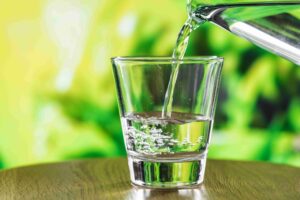How Much Water Should You Drink a Day?
As we all know Water is an important ingredient to the foundation of life, whether it is about getting the body hydrated on a hot day or promoting healthy function of the body. But how much water should you drink per day?
We are all familiar with the age-old advice to drink 8, 8-ounce glasses of water daily — but is this enough (and necessary)? So today, we are going to look at the science of hydration and explore how much water our body requires and why staying hydrated is crucial to your health.
The Role of Drinking Water
Each of us is made up of approximately 60% water, and every cell in our body requires it to perform at its best. Digestion, circulation, nutrient absorption, and temperature regulation are just some of the few processes in which water participates in our body. Mild dehydration can significantly affect how you feel and perform.
Dehydration can cause you to have headaches, and fatigue, make your skin dry, and has a Profound Impact on Concentration. Severe dehydration can cause kidney failure, urinary tract infections, and possibly even heatstroke.
How Much Water Should You Drink a Day?
Many peoples have a question That how much water should I drink a day? The right amount of water you require will vary depending on your age, gender, and levels of activity. These can all help provide an idea of how much water should you drink daily.
The 8×8 Rule for hydration
A general rule of thumb for healthy hydration is the 8 x 8 guideline, recommending you drink 8 Glasses of Water (8 Ounces Each) daily or more! It is an easy guideline to remember and can serve as a good starting point for many people.
Although the 8×8 rule is a good point of reference, how much water should you drink for optimal hydration can vary depending on Lifestyle, Diet, and Health Matters.
Recommendations from the Institute of Medicine (IOM)
How Much Water Should You Drink a Day? An even better recommendation is from the IOM, which indicates:
- Men: Around 3.7 liters (125 ounces) of total water intake per day
- Women: Around 2.7 liters (91 ounces) daily of total water intake
Keep in mind, that “total water intake” is all fluid consumed, not just water. You can get it from any drink that you make without sugar such as unsweetened tea, coffee, juice, and foods (which contain water) like fruits and vegetables.
Elements That Impact Your Water Requirements
How Much Water Should You Drink? the requirement for water fluctuates depending on different circumstances. The determination of water content can be affected by a wide range of external factors – here are some standard ones:
Your activity level:
Sweat also causes your body to lose water. Drink water to recover the body water level you lose during physical activity. Aim to drink more water before, during, and after a workout. And your water intake also depends on how hard your workout is. You may require extra 1 to 2 glasses of water after hard training.
Climate and Condition:
In hot or humid weather, you lose more water through sweat so you need to drink more amount of fluid. But you can also get dehydrated while it’s cold out, simply breathing dry air (or doing vigorous exercise at high altitude) could lead to respiratory water loss.
Diet:
Some foods you eat also add to your fluid consumption. Multiple fruits and vegetables are water-rich, such as watermelon, cucumber, and oranges. In contrast, if you consume a lot of salt or sugar your body might need more water to stay balanced.
Pregnancy and Breastfeeding:
When women are pregnant or breastfeeding, they often need to drink more water for the mother’s body and the baby’s brain health. This typically amounts to 91 ounces of total water/day for pregnant women and 104 ounces/day for breastfeeding women.
Health problems:
Some health conditions — such as kidney disease, heart disease, or diabetes may be related to dehydration. So, if you have a medical condition that might impact your hydration requirements, contact your doctor.
Sickness:
If you are sick, especially if it causes vomiting or diarrhea, your body loses fluids faster. The immune system needs nutrients and fluids to retain energy when we are ill, drinking plenty of fluids helps the immune system to play its role better.
Sometimes this needs to be replaced in the form of oral rehydration solutions that contain water and electrolytes.
How Much Water Should You Drink? Signs of dehydration
Your body is pretty good at giving you signals when your body is in dire need of water, you may be a little dehydrated by the time you are thirsty. More Signs of Dehydration:
– Dark-colored urine (a very light yellow is great)
– Dry mouth or lips
– Fatigue or dizziness
– Headaches
– Dry skin
If having these symptoms regularly, your body talking to you to drink more water.

Can You Drink Too Much Water?
Dehydration is the most common concern, but you also can run into problems by overhydrating. Consuming excessive water may also result in an ailment known as “hyponatremia”, characterized by significantly low blood sodium levels. Hyponatremia typically occurs in extreme circumstances, such as excessive fluid intake without electrolytes during prolonged endurance events.
To not be over hydrated it is important to find balance. How Much Water Should You Drink, so drink when you are thirsty, and if you are exercising in intense or hot climates, keep an eye on your water intake.
Tips to Help You Stay Hydrated
Keeping track of your water consumption does not have to become a burden. These are some simple suggestions on How Much Water Should You Drink.
Carry a Water Bottle:
A simple reusable water bottle should always be with you. This way it is easier to take small doses of water comfortably over a long period.
Set Reminders:
If drinking water frequently is usually overlooked, then use a water tracking application on your phone or a traditional alarm on your mobile device to remind you.
Infuse Your Water:
In the case when you find boring plain water, then you can add some of the natural flavors like lemon or cucumber. A flavored blue soda can be more refreshing than simple water.
Eat Hydrating Foods:
Instead of only eating solid foods, ensure that you add more water-filled foods to the dishes taken during a meal. Such foods include watermelon, cucumbers, strawberries, and cello.
Start Your Day with Water:
Try and drink some water immediately upon waking up in the morning to under-hydrate your body which will have starved of water due to sleep.
Pace Yourself:
Do not overfill your stomach with water at a time trying to reach the Remember to take frequent and small amounts of water throughout the day.
Track Your Urine Color:
Hydration levels can be effectively gauged by simply observing the color of one’s urine. Aim for pale yellow as a sign of good hydration.
Hydration for Athletes and Outdoor adventure

How Much Water Should You Drink if you are an Athlete?
For athletes and outdoor adventurers, water becomes even more important when you’re physically active. If you participate in any sort of endurance sports or are planning on a long hike, you will need to take care of your water intake and electrolytes as well.
Electrolytes such as sodium, potassium, and magnesium are necessary for some of our body’s most vital functions. Drinking water alone may not be sufficient to keep those levels in check.
Drink electrolyte-fortified liquids or use supplements during prolonged activities, particularly when it is hot and humid. Listen to your body and don’t over drink.
How Much Water Should You Drink? Conclusion:
There is no one-size-fits-all answer to this question. The 8×8 rule and IOM guidelines are both reasonable suggestions, but estimates at best. Paying attention to your body, keeping an eye out for signs of dehydration, and adjusting your needs based on direct variables such as climate, and activity level, and indirect variables such as types of food you eat will get you the best estimate possible for your hydration requirements.
How Much Water Should You Drink a Day? To stay well hydrated, drink 8-10 cups (64-80 oz) of water daily, and adjust for your needs based on your activity level, the temperature and climate where you live and how healthy you are. Drinking enough water will help you have more energy and mental clarity, and better physical performance. Water helps with weight loss, and healthy skin, hair, and nails. Water is a powerful cleaner that flushes toxins out of our systems, keeping blood pressure low.

